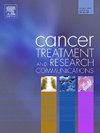Gastric cancer—Epidemiology, modifiable and non-modifiable risk factors, challenges and opportunities: An updated review
IF 2.4
Q3 Medicine
引用次数: 0
Abstract
Gastric cancer represents a significant global health challenge due to its high mortality and incidence rates, particularly in Eastern Asia, Eastern Europe, and South America. This comprehensive review synthesizes the latest epidemiological data and explores both modifiable and non-modifiable risk factors associated with gastric cancer, aiming to delineate the multifactorial etiology of this disease. Modifiable risk factors include Helicobacter pylori infection, obesity, dietary habits, smoking and alcohol consumption, whereas nonmodifiable factors comprise genetic predispositions, age, family history and male gender. The interplay of these factors significantly impacts the risk and progression of gastric cancer, suggesting potential preventive strategies. The challenges in treating gastric cancer are considerable, largely because of the late-stage diagnosis and the heterogeneity of the disease, which complicate effective treatment regimens. Current treatment strategies involve a combination of surgery, chemotherapy, radiotherapy, and targeted therapies. The FLOT regimen (5-FU, Leucovorin, Oxaliplatin and Docetaxel) is now a standard for resectable cases in Europe and the US, showing superior survival and response rates over ECF and ECX regimens. For HER2-positive gastric cancer, trastuzumab combined with chemotherapy improves overall survival, as demonstrated by the ToGA trial. Additionally, immune checkpoint inhibitors like pembrolizumab and nivolumab offer promising results. However, the five-year survival rate remains low, underscoring the urgency for improved therapeutic approaches. Recent advancements in molecular biology and cancer genomics have begun to pave the way for personalized medicine in gastric cancer care, focusing on molecular targeted therapies and immunotherapy. This review also highlights the critical need for better screening methods that could facilitate early detection and treatment, potentially improving the prognosis. By integrating epidemiological insights with new therapeutic strategies, this article aims to thoroughly understand of gastric cancer's dynamics and outline a framework for future research and clinical management, advocating for a multidisciplinary approach to tackle this formidable disease.
胃癌--流行病学、可改变和不可改变的风险因素、挑战和机遇:最新综述。
胃癌的死亡率和发病率都很高,尤其是在东亚、东欧和南美地区,是全球健康面临的重大挑战。这篇综合性综述综合了最新的流行病学数据,探讨了与胃癌相关的可改变和不可改变的风险因素,旨在阐明这种疾病的多因素病因。可改变的风险因素包括幽门螺杆菌感染、肥胖、饮食习惯、吸烟和饮酒,而不可改变的因素包括遗传倾向、年龄、家族史和男性性别。这些因素的相互作用对胃癌的风险和进展产生了重大影响,并提出了潜在的预防策略。胃癌的治疗面临巨大挑战,这主要是因为胃癌的诊断较晚,而且疾病具有异质性,这使得有效的治疗方案变得复杂。目前的治疗策略包括手术、化疗、放疗和靶向疗法的综合治疗。FLOT方案(5-FU、亮菌素、奥沙利铂和多西他赛)目前已成为欧美可切除病例的标准方案,其生存率和反应率均优于ECF和ECX方案。对于 HER2 阳性胃癌,曲妥珠单抗联合化疗可提高总生存率,ToGA 试验也证明了这一点。此外,pembrolizumab 和 nivolumab 等免疫检查点抑制剂也取得了可喜的成果。然而,五年生存率仍然很低,这凸显了改进治疗方法的紧迫性。分子生物学和癌症基因组学的最新进展已开始为胃癌治疗中的个性化医疗铺平道路,重点是分子靶向疗法和免疫疗法。这篇综述还强调了对更好的筛查方法的迫切需要,这些方法可促进早期检测和治疗,从而改善预后。通过将流行病学见解与新的治疗策略相结合,本文旨在深入了解胃癌的动态变化,并为未来的研究和临床管理勾勒出一个框架,倡导采用多学科方法来应对这一可怕的疾病。
本文章由计算机程序翻译,如有差异,请以英文原文为准。
求助全文
约1分钟内获得全文
求助全文
来源期刊

Cancer treatment and research communications
Medicine-Oncology
CiteScore
4.30
自引率
0.00%
发文量
148
审稿时长
56 days
期刊介绍:
Cancer Treatment and Research Communications is an international peer-reviewed publication dedicated to providing comprehensive basic, translational, and clinical oncology research. The journal is devoted to articles on detection, diagnosis, prevention, policy, and treatment of cancer and provides a global forum for the nurturing and development of future generations of oncology scientists. Cancer Treatment and Research Communications publishes comprehensive reviews and original studies describing various aspects of basic through clinical research of all tumor types. The journal also accepts clinical studies in oncology, with an emphasis on prospective early phase clinical trials. Specific areas of interest include basic, translational, and clinical research and mechanistic approaches; cancer biology; molecular carcinogenesis; genetics and genomics; stem cell and developmental biology; immunology; molecular and cellular oncology; systems biology; drug sensitivity and resistance; gene and antisense therapy; pathology, markers, and prognostic indicators; chemoprevention strategies; multimodality therapy; cancer policy; and integration of various approaches. Our mission is to be the premier source of relevant information through promoting excellence in research and facilitating the timely translation of that science to health care and clinical practice.
 求助内容:
求助内容: 应助结果提醒方式:
应助结果提醒方式:


